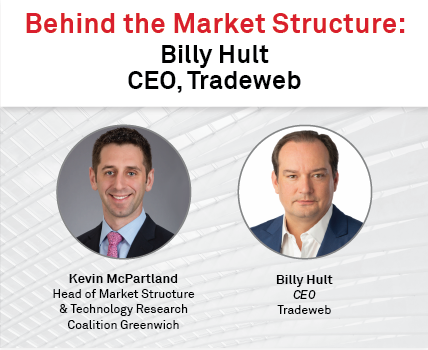Behind the Market Structure: An Interview with Billy Hult, CEO, Tradeweb

“It’s been a great year. This is still a relationship business. That said, the relationship component is part of the overall experience that technology has delivered to our clients,” Tradeweb CEO Billy Hult recently told Coalition Greenwich Head of Market Structure & Technology Research Kevin McPartland in an interview at Tradeweb’s New York headquarters in front of a live audience.
E-Trading in U.S. Treasuries: Onward and Upward
Ten years ago, few market participants gave credence to e-trading becoming pervasive across fixed-income securities. Yet, the market is heavily electronic today. Is there room for further electronification?
Hult certainly thinks so. He points out that while the U.S. Treasuries market is fully electronic on the wholesale side, “the client piece of the market has a ton of electronification still to go. There is still that voice business around larger-size and more complex trades. We've been massively focused on the continued automation of the whole market, where some of the larger, market-moving trades get broken down into more digestible parts and then get transacted electronically,” he explains.
Trading protocols that allow for seamless transaction of big block trades are also still evolving. “The complexity of these protocols is what makes our jobs fun,” says Hult.
He’s equally optimistic about expanding e-trading in the “so, so important” repo markets. And he expects Tradeweb to play a larger role around the “basis trade” too. “We have the ability to scale and leverage the repo business because of our role in the government bonds market. A lot of clients have an overlap, like the hedge fund community, which plays an instrumental role on repo,” he states.
As for the acquisition of r8fin, which specializes in algorithmic-based execution for U.S. Treasuries and interest-rate futures, he expects it to have a knock-on effect on Tradeweb’s existing business. “I just love the concept of creating optionality,” he says.
Data, Bonds, EM: The Growth Opportunities
Undoubtedly, data is crucial to power algos and e-trading. But the fixed-income markets have gone from a data drought to a problem of plenty for market participants today—and therein lies a commercial opportunity for players like Tradeweb.
“We understand how to carve out optionality for us to monetize more complex data… Today, data is playing a bigger, more sophisticated role around say, ‘How do I find my ax, or how do I find my liquidity in a tough market—and how do I find it fast?’ The data is directing that flow in a way that has massive amplification effects for our business… It’s like a one-way train—the client base is getting more sophisticated, not less, and they're investing more, not less. So, it’s all going in the right direction,” Hult observes.
Meanwhile, e-trading in corporate bonds is growing as well. “My general instinct is that the types of bonds and quantity of bonds that will get executed is going to change dramatically,” he states.
Tradeweb is also eyeing emerging markets for growth. “Looking back at this year, if someone asked me what's been the most successful thing this company has done, it would be hard to not talk about the forward progress we've made around EM,” he says referring to the Yieldbroker acquisition.
Looking Ahead to 2024
What are the CEO’s expectations for 2024? “My instinct is there's going to be pretty significant change coming in the government bond market,” he contends, referring to regulatory moves on central clearing in government bonds. “My instinct is we're getting closer [to it],” states the English major, who is “always trying to learn” from “as many business-oriented books as I can.” He’s currently digging into Rob Copeland’s The Fund on legendary hedge fund manager Ray Dalio. “It’s a super fascinating read.”
Undoubtedly, the fixed-income market will deliver its own “page-turner” in 2024—and Billy Hult intends Tradeweb to take the lead in plotting the e-trading action.

